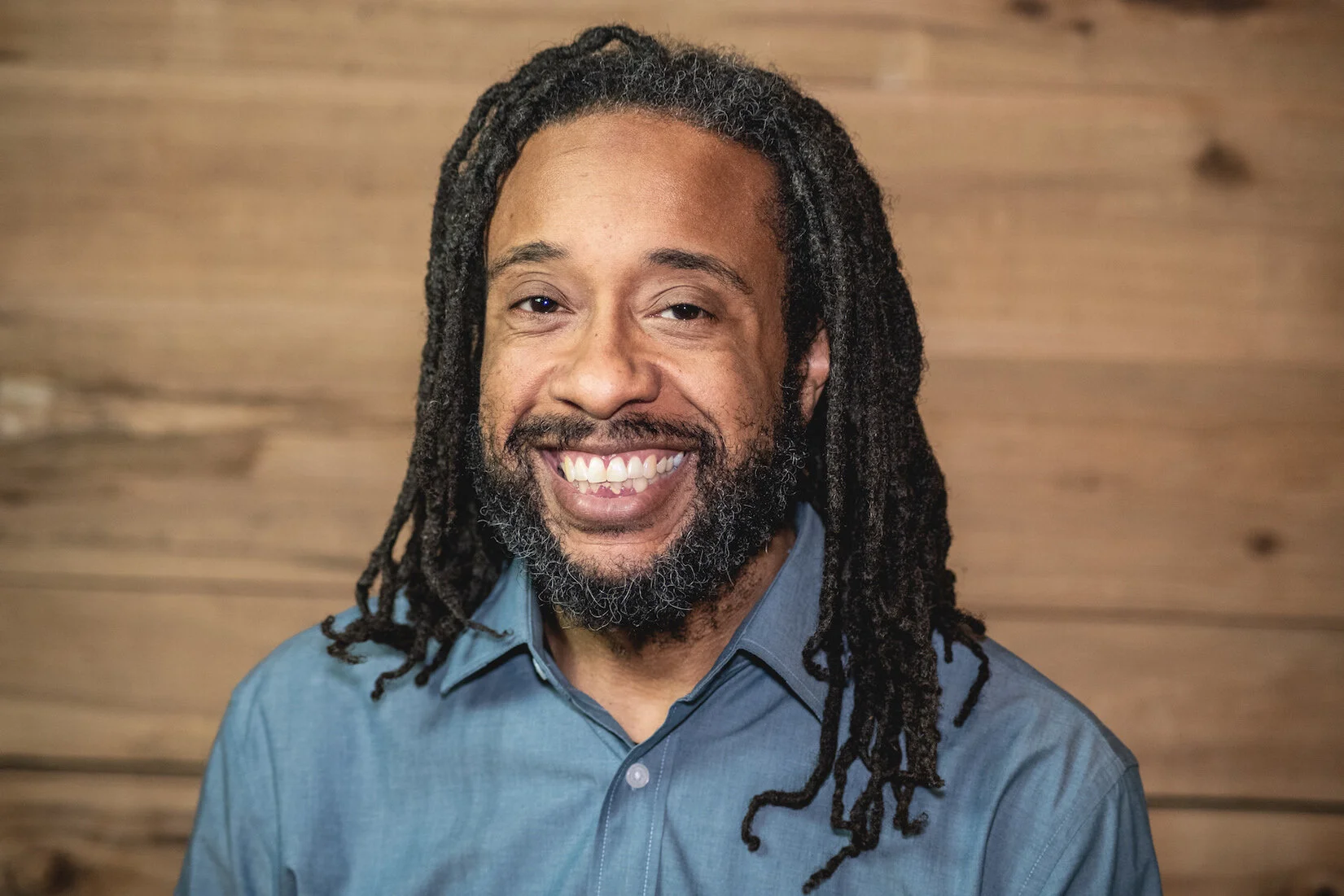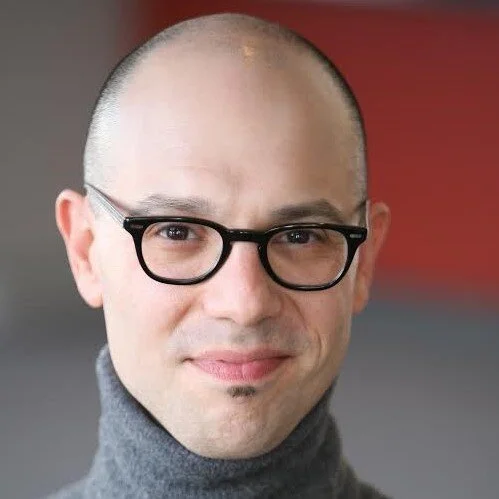James J. Johnson
Building a life in art requires mental flexibility, curiosity and resilience. An artist must find a way to cobble together a multitude of opportunities, calendars and streams of income not only to keep afloat, but to thrive.
When we catch up with actor and playwright James J. Johnson, he is doing just that — thriving. And, for a theatre artist during a pandemic, that’s no mean feat. Juggling audiobook narration, a new solo show commission, screenwriting projects and more, he says, “You know, as bad and as awful as thing have been in this last year, personally and nationally, globally, there have been some silver linings.”
(continued after video)
With a resume including work with Arena Stage, Woolly Mammoth Theatre Company, Ford’s Theatre and the Kennedy Center, as well as film and voice over work, Johnson has steadily built a reputable acting career over the past couple of decades. In recent years, he has expanded to writing for stage and screen, as well as working as an arts educator and arts community organizer.
He’s come a far distance from his childhood watching Mork & Mindy, listening to Bill Cosby and Richard Pryor albums and dreaming of a career in comedy.
“It was like a system of trying things,” he explains. “When something happened, and it was successful, it was a path to gaining confidence. Taking chances. And if it worked, then I was like, ‘Okay, then let's try something else. Let's dive a little bit deeper.’” For Johnson, that meant studying theatre and breaking out of a shell as a “uptight and shy kid.”
Through college and into adulthood, those deeper dives moved onto the internet and into social media, which eventually led to writing. “That was the way I was kind of formulating, trying things out and getting responses and saying, ‘Okay, maybe I should try to write something longer.’” He laughs and adds, "I feel like I'm taking the scenic route through my career. No rush, you know what I mean?”
As he built his stage acting career, he developed his writing chops with work like the play “Wannabe”, gradually leading to his current project, a Solo Works Commission from 1st Stage.
“I had actually started to do the groundwork for what I had as an idea for three separate shows — two solo shows and a two-hander,” he says. “So when this commission came around it motivated me to concentrate on just one track of the three shows. What I had been working on was, I wanted to do a solo show for each of my parents. So telling my dad’s story, and then having another actor play my mom, and let that be a solo show about my mom's life, and then a two-hander where we tell my parents life after they were together.”
“Now more African-Americans, more people of color, are telling their stories. You know, it wasn't just about the big names like the Rosa Parks and the Martin Luther Kings. There are people in very small towns who may not have had the education, but there may have been moments in their life where they stood up, or where they came in contact with racism, and they resisted. And there’s great stories.”
Johnson chose to focus on his father’s story for the 1st Stage commission. “I was always fascinated with my dad's life,” he explains. “He was a drummer. And he drummed for a soul group when he was a teenager, called Shades of Soul, in Fauquier County, Virginia. They actually got to play backup for a lot of the soul groups who would come around on the Chitlin Circuit. So like the Stylistics, Sam and Dave, the Chi-Lites. And so my dad got to play for some of those big names back then as a teenager. But then he was also involved in, you know, shady activities, and he got kicked out of school in 10th grade. And all this stuff that happened before I came around. The man that I knew growing up was a preacher. He was a construction worker, he had his own small home repair business, and, you know, he had kind of cleaned his act up around the time that I came into existence. So I just kind of want to explore the, the his past, you know, before I, you know, came into the picture.”
His parents met when his mother was eight years old — on her first day in Virginia after her family moved from New York and entered Jim Crow culture shock. “It's a whole story, man,” Johnson laughs.
In fact, he’d begun work on her story before the solo show commission. A monologue he’d written for a play based on her life appeared in a monologue contest Johnson created in 2020 as an effort to give actors work and connection during the early stages of the pandemic. In February of last year, a young actor reached out to Johnson with a request. Could James write a monologue every month for the actor to practice with? “My instinct is always to say ‘no,’” Johnson laughs. “But then I was like, this could be a good writing exercise.”
As that writing work developed, Johnson found himself falling in love with these monologues and wanting to hear them from other actors, as well. This developed into a monologue competition, judged by theatre professionals. “We were able to give away a few hundred dollars to the top three winners of that, and we had fun doing it. So then I decided to try to try it again. And that's when I used the monologue from my mom's story, for the second monologue contest.”
The monologue contests are indicative of Johnson’s dedication to the Washington DC area theatre community. He also co-founded a group called Galvanize DC, which is a support network for Black theatre artists in DC.
“That's a part of why I came back to DC when I went to New York for like, a hot minute,” he says. “I just missed the way we we hold community here. And, you know, it's kind of who I am at my core. I want to do as much as I can to maintain community, where I go, especially in a business that has a reputation for being so competitive and kind of selfish and self-centered. I want to fight against that. We can still compete, quote-unquote, for the same roles, but we can still be friends and love each other the end of the day.”
Our conversation turns to the role of art in the current American turbulence. “I feel like artists have this ability to take the past, the present and the future, and bring it together and remind people that art has always been saying the same … I’m specifically thinking of hip-hop, I’m thinking of TV shows and how they’ve always talked about police brutality. They’ve always talked about these things. Richard Pryor talked about it. It was funny. White people — millions of white people — watched and laughed. But still, it didn’t quite click.”
“But now, with the immediacy of social media and cameras on phones, I think it has made it more immediate for people. Art just has to continue to remind people of our past. And to remind them of what our responsibility is now … When the art is sharp and pointed, that’s when you can really poke at the Zeitgeist or the consciousness of the people.”
Our discussion of Richard Pryor expands to Dave Chapelle, and how, in the heyday of his show, you could always expect some white folks around the office to be quoting him on the following day … but those people never seemed to draw a connection between themselves and the comedy, or the pain behind the comedy.
“So many white people are so quick to claim that they’re not racist,” Johnson says. “Not really understanding what racism is — equating racism to just hate. Or ‘I don’t say the N word,’ so that’s [their] standard of not being racist. It’s not fully understanding what it means … So they can get away with, you know, ‘Dave Chapelle or Richard Pryor is not talking about me. I’m not a cop.’”
“It goes into the whole individualism of Western culture and how, especially for white people, they can separate themselves from each other in a way that, as Black people … I remember being in first grade or kindergarten and I was at a predominately white school with maybe 5% Black students, in a small Virginia town. They would pull out the TV to watch PBS or some show, and as soon as a Black face came on the screen, then all eyes were on me, filling [me] with that awkwardness. And I’m like, ‘When white kids come on the screen, do white kids feel self-conscious?’”
This is something that we as a society and, particularly, we as artists, must grapple with to move into a more equitable future. Decentralizing the white experience as the archetype for the “universal,” and deliberately engaging with everybody in the creation, funding, execution and benefits of work.
“It’s a very clumsy thing at first,” Johnson says. “It has to be a very deliberate thing, like, ‘Okay, I need five Black people, five Asian people, five Trans women.’ It has to be very deliberate at first, until it becomes organic and then you don’t feel right unless you‘ve got a mix of people. That’s the world that I love and that I live in.”
“I know that people … who hold on to their racism and other isms and their phobias are people who just don't have the exposure that we have to the eclectic groups of people that I think, as artists, sometimes we can take for granted,” he adds. “Not everyone gets to do that. And so some of us get to evolve quicker. So I think as we move forward, like I said, making sure that we're including everyone in the discussions and the moving forward — that that also includes class, and just remembering were our privilege lies as artists.”






